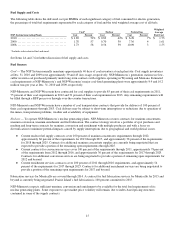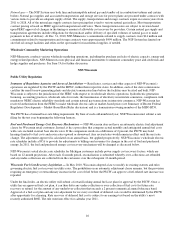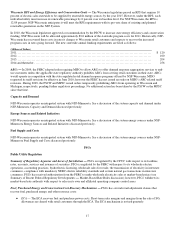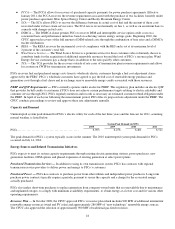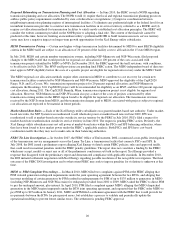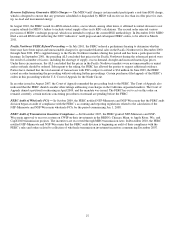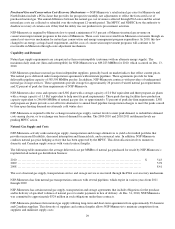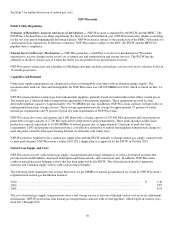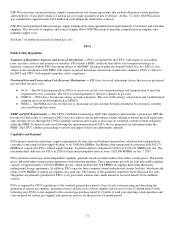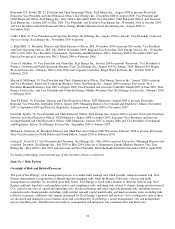Xcel Energy 2010 Annual Report Download - page 35
Download and view the complete annual report
Please find page 35 of the 2010 Xcel Energy annual report below. You can navigate through the pages in the report by either clicking on the pages listed below, or by using the keyword search tool below to find specific information within the annual report.
25
In July 2010, the WECC issued a non-public NAV related to (1) two alleged non-common CIPS violations identified in the joint
CIPS spot-check, and (2) two violations self-reported by PSCo related to certain BAL standards. The WECC NAV proposed a
non-material penalty. PSCo requested that the proceedings be deferred to allow settlement negotiations to resolve the NAV. The
matter is now in settlement discussions. Based on these discussions, a second self-report similar to one of the previously filed
BAL self-reports was filed and this report will be resolved along with the other matters pending with WECC. None of the alleged
or self-reported violations is expected to result in a material penalty.
In 2010, SPP conducted its triennial audit of SPS compliance with certain NERC mandatory electric reliability standards. The
audit did not include an evaluation of SPS compliance with NERC CIPS. The auditors found no standards violations. The written
SPP audit report is now being completed.
In November 2010, the NSP System, PSCo and SPS filed self-reports with the MRO, WECC and SPP, respectively, regarding
potential violations of certain NERC CIPS. Additional self-reports of potential violations of CIPS standards were filed in January
2011. Based on the issues identified with CIPS compliance, the utility subsidiaries submitted a mitigation plan that provides for a
comprehensive review of their CIPS compliance programs. Whether and to what extent penalties may be assessed against the
utility subsidiaries for the issues identified and self-reported to date is unclear.
In February 2011, the NSP System will be subject to a comprehensive triennial audit by the MRO regarding compliance with
various NERC mandatory reliability standards, including CIPS.
NERC Compliance Investigations
In September 2007, portions of the NSP System and transmission systems west and north of the NSP System briefly islanded
from the rest of the Eastern Interconnection as a result of a series of transmission line outages. In addition, service to
approximately 790 MW of load was temporarily interrupted, primarily in Saskatchewan, Canada. The initial transmission line
outages occurred on the NSP System. In March 2008, NSP-Minnesota received notice that the MRO was commencing a
compliance investigation of the event. Because the event affected more than one region, the NERC took over the investigation. In
January 2010, the NERC issued a preliminary non-public report alleging the NSP System violated certain NERC reliability
standards. The report represents the preliminary conclusions of the NERC and is subject to additional procedures at NERC, and
ultimately FERC review. In late 2010, NERC transferred responsibility for completing the compliance investigation to the MRO.
The final outcome of the compliance investigation, and whether and to what extent penalties for violations may be assessed, is
unknown at this time.
In February 2010, the NERC notified NSP-Minnesota that it was commencing a non-public investigation of NSP-Minnesota
maintenance practices associated with insulating oil levels in bulk electric system substations, as the result of an anonymous
complaint received by the NERC. NSP-Minnesota is fully cooperating with the investigation. The final outcome of the NERC
compliance investigation, and whether and to what extent NERC may seek to impose penalties for violations, is unknown at this
time.
NERC Advisory Regarding Impact of Transmission Field Conditions on Facility Ratings — In October 2010, the NERC issued
an advisory requiring utilities to perform an assessment of field versus assumed “as built” transmission infrastructure conditions.
In December 2010, the NERC issued a revised advisory extending the period for affected entities to complete their initial
assessment and corrective actions until 2013 and 2014, respectively. The advisory compliance cost for the utility subsidiaries is
estimated at $25 million to $30 million. Xcel Energy will seek recovery through applicable rate-making mechanisms.
Electric Transmission Rate Regulation — The FERC regulates the rates charged and terms and conditions for electric
transmission services. FERC policy encourages utilities to turn over the functional control of their electric transmission assets for
the sale of electric transmission services to an RTO. NSP-Minnesota and NSP-Wisconsin are members of the MISO RTO. SPS is
a member of the SPP RTO. Each RTO separately files regional transmission tariff rates for approval by the FERC. All members
within that RTO are then subjected to those rates. In 2009, PSCo filed a tariff to participate with other utilities in WestConnect, a
consortium of utilities offering regionalized non-firm transmission services. The WestConnect tariff was effective in the first
quarter of 2009. The WestConnect tariff has not had a material impact on PSCo transmission usage or revenues. WestConnect
may provide wholesale energy market functions in the future, but would not be an RTO.


